At the heart of the Watergate scandal lies a far more complex story than most realize.
While the public remembers it as a political crisis centered on President Nixon’s administration, deeper forces were at play—particularly involving U.S. foreign policy and covert alliances.
Behind the scenes, Nixon’s efforts to reshape relations in the Middle East, especially his secret negotiations with Saudi Arabia’s King Feisal and Palestinian leader Yasser Arafat, were quietly sabotaged.
This post explores the shadowy connections between Watergate, Israeli influence, and CIA operatives, revealing how international intrigue shaped one of America’s most infamous political downfalls.
Nixon’s Secret Middle East Diplomacy Amid Watergate
In Final Judgment, Michael Collins Piper included a detailed appendix highlighting much of Miss Davis’s research, emphasizing that as the Watergate scandal unfolded, Richard Nixon was deeply at odds with Israel.
British journalist Alan Hart revealed that Nixon was quietly working with Saudi Arabia’s King Feisal behind the scenes, striving to achieve a lasting resolution to the Israeli-Palestinian conflict.
Nixon’s Back-Channel Peace Efforts and Kissinger’s Intervention
British journalist Alan Hart’s 1984 book, Arafat—Terrorist or Peacemaker? (published by Sidgewick & Jackson), details Nixon’s attempt to use Saudi King Faisal as a mediator in secret negotiations with Palestinian leader Yasser Arafat.
These back-channel talks aimed at a comprehensive peace settlement in the Middle East.
However, when Secretary of State Henry Kissinger discovered the negotiations—initially kept from him—he intervened and halted the Nixon-Feisal peace initiative, apparently viewing it as a threat to Israel.
Hart also highlights that Nixon warned Feisal if Israeli interests and their American lobby continued to block his peace efforts.
Nixon was prepared to abandon his scripted State of the Union address and go directly to the American public to expose Israel and its lobby as the primary obstacles to peace in the region.
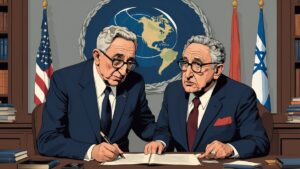
CIA Loyalists and the Setup Behind Watergate
During this same period, CIA figure James Angleton had placed trusted operatives within the White House.
Richard Ober, one of Angleton’s top men, was stationed close to the presidency.
Meanwhile, James McCord—a longtime Angleton associate—was not only involved in CIA operations but was also one of the Watergate burglars.
Many believe McCord may have deliberately sabotaged the burglary.
The goal, it is argued, was to entrap the Nixon administration. This theory suggests that the Watergate break-in may have been compromised from the inside.
It has been suggested by Michael Collins Piper that the nickname “Deep Throat” was not randomly chosen.
Instead, it may have been an “inside joke” among Bob Woodward and his colleagues at The Washington Post, hinting at the covert and perhaps mocking nature of the entire affair.
“Deep Throat” and the Israeli Desk Connection
The use of the codename “Deep Throat” has been seen as a deliberate signal to insiders in official Washington.
It pointed not to a rogue whistleblower, but rather to the involvement of James Angleton—Israel’s most devoted ally inside the CIA.
According to Michael Collins Piper, the message was clear to those familiar with Washington’s inner workings: the real source behind the leaks to The Washington Post came from Angleton’s camp.
In this view, the Watergate affair was not a simple political scandal, but a carefully crafted dirty tricks operation.
This operation, it is believed, was managed from Angleton’s Israeli desk within the White House itself.
While Richard Ober may have served as the voice behind “Deep Throat,” Angleton acted as the ventriloquist—managing the entire performance from behind the curtain.
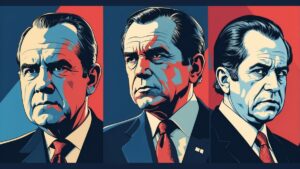
Did Israel Orchestrate Nixon’s Fall?
Former American diplomat Richard Curtiss—executive editor of The Washington Report on Middle East Affairs—did not mince words.
In 1995, Curtiss stated clearly that the individual known as “Deep Throat” was likely nothing more than a conduit.
The real intelligence, according to Curtiss, had been gathered by Israel’s Mossad and then used to discredit President Nixon.
Curtiss went even further. He asserted that Nixon’s efforts to reevaluate America’s special relationship with Israel had served as the immediate trigger for his political downfall.
So a question arises: was Watergate an Israeli operation, executed with help from friendly assets inside the CIA? Was this another kind of presidential “assassination”—not by bullet, but by sabotage?
The Hidden World of Private Intelligence Networks
Another book that connects loosely to the Watergate affair—but more deeply explores the dark world of intelligence manipulation during the turbulent 1960s and 1970s—is Spooks: The Haunting of America—The Private Use of Secret Agents by The book was published in 1978 by William Morrow & Company.
This volume delves into the private employment of secret agents by the rich, the politically powerful, and multinational corporations.
Thousands of intelligence operatives—once employed by the U.S. government—were later hired by private interests.
These well-trained agents formed a shadow network, one that operated largely outside public oversight.
According to a description posted on Amazon.com, America has become “haunted” by these government-trained spooks.
The book describes how private “Mission Impossible” outfits emerged in corporate America, even within Fortune 500 companies.
The cast of characters includes Ivy League bagmen, mafia-linked mercenaries, wiretap specialists, counter-terror experts, and elite assassins with private jets.
Their missions have included coups for profit, blackmail rings, and custom-built surveillance devices created in quiet suburban homes.
Michael Collins Piper considered Spooks not only revealing, but essential reading for anyone seeking to understand the real forces shaping political outcomes during that era.
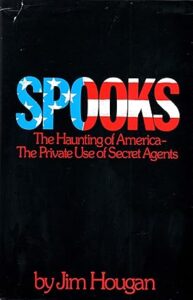
Andrew St. George and the Spooks of Watergate
One of the more colorful personalities mentioned in Spooks is Spotlight journalist Andrew St. George.
In fact, the book opens with a quote from him—setting the tone for what follows.
St. George is portrayed in connection with the notorious arms dealer Mitch WerBell.
His insider knowledge of the intelligence world gave him a unique vantage point.
He may have been the very first member of the American media to receive reliable information about Watergate.
That information came directly from one of his longtime contacts—Frank Sturgis, one of the Watergate burglars.
St. George and Sturgis had known each other for years.
Their relationship dated back to St. George’s time as a Time-Life correspondent in Cuba, before, during, and after the revolution.
During that chaotic period, Sturgis had shifted sides—working first with Fidel Castro, then against him.
It was an era when changing allegiances were common, and St. George had a front-row seat to history.
The depth of St. George’s connections placed him in a rare position.
Through his relationships, early details about the Watergate affair had already begun to circulate well before the public was aware.
Andrew St. George and the Secret War Against Castro
Andrew St. George also appears—once again in larger-than-life fashion—in The Fish is Red: The Story of the Secret War Against Castro (HarperCollins, 1981) by Warren Hinckle and William W. Turner.
This work was later reissued under a new title: Deadly Secrets: The CIA-Mafia War Against Castro and the Assassination of JFK (Thunder’s Mouth Press, 1991).
The book is essential reading for those interested in the tangled web of intelligence operations, rogue agendas, and geopolitical intrigue that shaped the latter half of the 20th century.
A wide-ranging cast of characters is examined, many of whom were directly involved in clandestine activities against Cuba and, ultimately, in the events surrounding the assassination of President John F. Kennedy.
The complex alliances, betrayals, and covert missions discussed in the book played a central role in shaping modern American history—and Andrew St. George’s presence offers yet another insider thread into this hidden world.
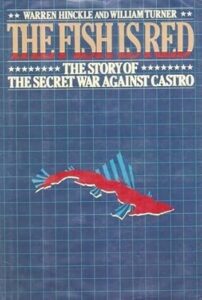
A New Scandal, Familiar Tactics
As a footnote to Watergate, it is worth briefly examining another major scandal: the Monica Lewinsky affair that rocked the Clinton White House.
Despite the widely accepted claim that Bill Clinton was treated favorably by the press, the facts suggest otherwise.
Media’s Unexpected Role
In reality, the Jewish-controlled mass media played a key role in fueling public exposure of the Lewinsky scandal.
This is often overlooked by those who assume Clinton received gentle treatment.
The New York Times Leads the Charge
In the January 4, 1999 issue of The Nation, writer Michael Tomasky identified The New York Times—the leading so-called “liberal” paper—as central in leaking damaging information tied to Special Prosecutor Ken Starr’s investigation.
“At every crucial turn and pivot,” wrote Tomasky, “the Times’ editorial page has marched in lockstep with the prosecutor and his cheering section.”
A Liberal Paper Against a Liberal President?
Tomasky explained that the Times serves as an “ideological Baedeker,” guiding elite liberal opinion across the nation.
In other words, the Times—long considered a voice for the pro-Israel establishment—was giving the green light to support Starr’s pursuit of Clinton.
Clinton and Israel
Why would a liberal president come under attack from a liberal institution?
The answer, which Tomasky did not mention, was explored in The Golem and later in The Confessions of an Anti-Semite by Michael Collins Piper: Clinton was viewed as insufficiently loyal to Israel.
A Deeper Media Network
This interpretation is supported by the 2001 book One Scandalous Story by veteran journalist Marvin Kalb.
Kalb examined the media frenzy around Monica-gate and identified The New York Times, The Washington Post, Newsweek, and ABC’s Nightline as the main outlets that stoked the flames.
Hidden Hands Behind the Headlines
Although Kalb did not state it directly, these outlets were drawing on sources close to the same neoconservative, pro-Israel networks that sought to obstruct Clinton’s pressure on Israel regarding peace negotiations.
This behind-the-scenes influence continues to surprise many who think they fully understand the Clinton legacy.
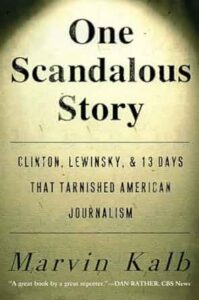
A Pattern of Power Struggles
Both the Watergate and Monica-gate scandals exposed deep internal divisions within the U.S. government.
At their core, each reflected a high-level battle over the direction of American foreign policy.
Foreign Policy as a Battleground
And that’s no small matter. After all, a nation’s foreign policy is central to its sovereignty—and those who shape it often operate far from public view.
In the pages that follow, American foreign policy—and the unseen hands guiding it—will be examined more closely.
The literature on the topic is vast. And the implications are profound.
Watergate Revisited: The Hidden Foreign Agenda Behind Nixon’s Fall
Watergate was never just about a break-in or a cover-up—it was about control.
At its core, the scandal marked the collision of a sitting president’s independent foreign policy ambitions with a network of entrenched intelligence interests, loyal not to the American people, but to a foreign agenda.
As this post has shown, Nixon’s attempts to broker peace in the Middle East—especially through back channels involving King Feisal and Yasser Arafat—ran directly against the goals of those invested in maintaining Israel’s regional dominance.
His challenge to this unspoken power structure likely sealed his fate.
From CIA operatives like James McCord and Richard Ober to media manipulation by insiders loyal to Israeli intelligence, the forces aligned against Nixon operated with surgical precision.
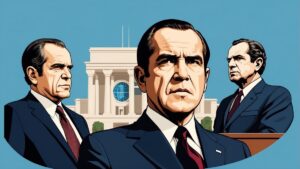
The codename “Deep Throat,” far from a random choice, symbolized the mockery and hidden hands behind his political destruction.
And just as with Clinton decades later, when media outlets once thought “liberal” turned with ferocity against a president deemed insufficiently loyal to Israel, we see a repeating pattern: when U.S. leaders threaten to steer foreign policy away from Tel Aviv’s interests, their downfall becomes not just possible—but inevitable.
Watergate, then, was more than a scandal.
It was a warning to any president who dares challenge the real power brokers in Washington.
